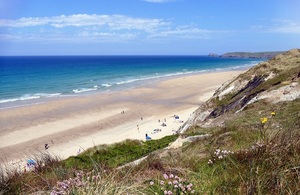Bathing water season begins
The Environment Agency is monitoring 419 bathing water sites across England until 30 September

The bathing water season started on Saturday 15 May with the Environment Agency carrying out regular testing of water quality at designated bathing sites until the end of September.
High standards of water quality at swimming locations are important for people’s enjoyment of beaches and other beauty spots in England.
Throughout the bathing season the Environment Agency will issue warnings of any forecasted pollution risk on its Swimfo website covering over 170 sites. Signs are also put up at these swimming locations to inform bathers about any possible dips in quality as a result of factors like rainfall, wind and high tides.
In the autumn the Environment Agency will publish its classifications – Sufficient, Good, Excellent or Poor – for each designated bathing water site.
The long-term trend for bathing water quality in England remains upward and overall quality is high. In 2019 98.3% of bathing waters achieved the minimum standard of Sufficient. Of these, 93% achieved the highest standards of Excellent or Good.
Environment Agency Chair Emma Howard Boyd said:
“High quality bathing waters benefit health and wellbeing and boost local economies. There were 135 million day visits taken to the seaside in England in 2019, which combined with overnight stays were worth £8.1 billion to the economy, so following the winter lockdown we have every reason to look forward to a Great British Summer this year.
“The high standards in bathing waters on the coast have taken significant investment and decades of hard graft. Now we’ll coordinate similar effort following the ground-breaking decision to designate a stretch of the River Wharfe as a bathing river. This will require collaboration and innovation to reduce pollution and improve the local environment. It will be difficult but should be achievable and provide learning we can apply to other rivers in the future.”
The Swimfo: Find a Bathing Water website provides immediate access to information on over 400 designated bathing waters including coastal locations, inland lakes and the newly designated area of the River Wharfe in Yorkshire. Knowing more about bathing water quality and the range and location of designated sites can help people get the most out of their visit.
Individual actions count
Actions in the home can have a damaging impact on our rivers and coasts. Pouring fats, oils and greases down the sink, and flushing wet wipes and other plastic products down the loo can cause blockages in our sewers that damage our environment. Putting them in the bin instead helps to protect water quality.